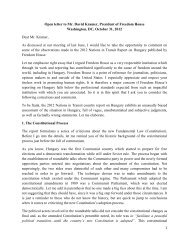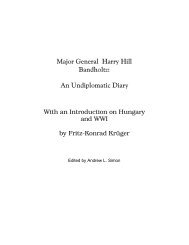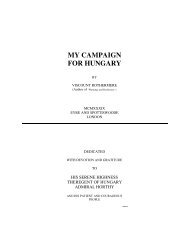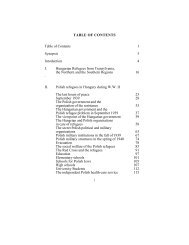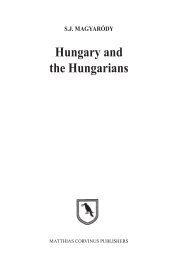The Fate of Western Hungary 1918-1921 - Corvinus Library ...
The Fate of Western Hungary 1918-1921 - Corvinus Library ...
The Fate of Western Hungary 1918-1921 - Corvinus Library ...
Create successful ePaper yourself
Turn your PDF publications into a flip-book with our unique Google optimized e-Paper software.
assessed from this perspective.” 18 It is thus unchallengeable that the first<br />
speaker <strong>of</strong> what was to become axiomatic was, in fact, Mihály Károlyi!<br />
How, then, did the almost-legendary statement, ascribed to Tisza, actually<br />
get said on the following day, Thursday, October 17 on the 824 th sitting <strong>of</strong> the<br />
Hungarian parliament? During the morning sitting, Count Tisza was first to<br />
take the floor and said the following with regard to political situation following<br />
the government announcement and the ending <strong>of</strong> hostilities: “Honored House! I<br />
do not wish to play tricks with words. I agree with what the Hon. Rep. Mihály<br />
Károlyi said yesterday, that we lost the war … We lost not in the sense that we<br />
could not carry on with exacting and heroic defense; that we could not but<br />
make the final victory for the enemy very costly. But yes, we lost in the sense<br />
that, due to the shift in the balance <strong>of</strong> strength, we have no more chance to win<br />
the war and, as a result, we must seek a peace on such terms as our enemies<br />
will accept under the situation. … Hence, I am <strong>of</strong> the same opinion that, with<br />
our German allies, we <strong>of</strong>fered peace to our enemies based on the Wilson 14<br />
Points and their attached points.” 19<br />
On the day after the coup carried out by the Károlyi government, November<br />
1, King Charles IV released the government, at their request, from the oath (<strong>of</strong><br />
allegiance) they swore to him. Later the same evening, the members <strong>of</strong> the<br />
government took an oath to “<strong>Hungary</strong> and the Hungarian people” before the<br />
president <strong>of</strong> the Hungarian National Council, János Hock (1859-1936), who<br />
was appointed to the position by the designated Prime Minister Károlyi, as his<br />
second-in-command. Also on this day, Minister <strong>of</strong> War, Béla Linder (1876-<br />
1962), ordered that Hungarian forces lay down their arms, while truce talks<br />
were going on in Padua between the Entente Powers and representatives <strong>of</strong> the<br />
Austro-Hungarian Monarchy.<br />
Well before this time, beginning in early <strong>1918</strong>, encouragement and agitation<br />
towards Austria from the “Greater Germany” circles could be noted among the<br />
Germans <strong>of</strong> western <strong>Hungary</strong>. This became particularly worrisome by the fall<br />
when, five days after the creation <strong>of</strong> the Austrian State Council led by Karl<br />
Renner, on November 17, <strong>1918</strong> it <strong>of</strong>ficially declared its claim to the – by this<br />
time independent – western areas <strong>of</strong> <strong>Hungary</strong>, made so by the Belgrade military<br />
treaty, 20 signed by the Károlyi government on November 13. <strong>The</strong> Austrian State<br />
Council stressed that it wished to achieve this not by military means but by a<br />
plebiscite, based on the principle <strong>of</strong> self-determination as stated in Wilson’s 14<br />
18 Az 1910. évi június hó 21-ére hirdetett Országgyűlés Képviselőházának Naplója<br />
[Parliamentary Record <strong>of</strong> the National Assembly convened on June 21, 1910]. Vol.<br />
XLI. Budapest, <strong>1918</strong>. Athenaeum Irodalmi és Nyomdai Részvénytársaság<br />
Könyvnyomdája, p. 277.<br />
19 Ibid, p. 292. (Bolding mine—J.B.) Count István Tisza was Prime Minister <strong>of</strong><br />
<strong>Hungary</strong> for the second time between June 10, 1913 and June 15, 1917. After that, he<br />
was leader <strong>of</strong> the parliamentary opposition – the majority, by the way. During this time,<br />
as colonel in the 2nd Hussar Battalion <strong>of</strong> Debrecen, he also spent several months<br />
fighting on the Italian front.<br />
20 Gagyi, op. cit., p. 6.<br />
13




